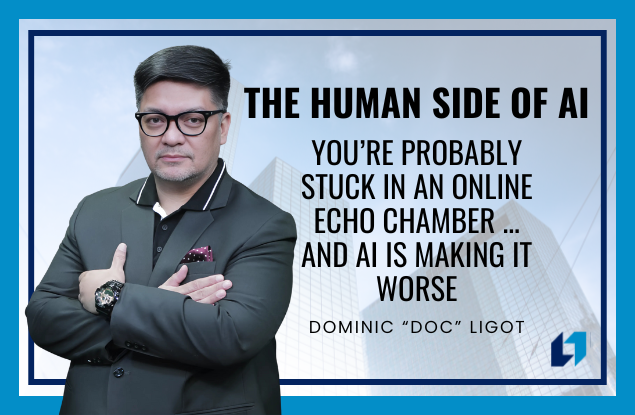Ever notice how Facebook always shows you posts you agree with? Or how Netflix seems to know just what kind of show you’ll binge next? That’s not a coincidence. Behind the scenes, powerful computer programs… called algorithms… are deciding what you see based on what you’ve liked, clicked, or searched before.
Sounds helpful, right? But when it comes to news, facts, and opinions, this can quietly trap you in something called an echo chamber… a digital bubble where you’re only exposed to ideas you already agree with.
And with the rise of generative AI, things are getting even trickier.
So What Exactly Is an Echo Chamber?
Think of it like this: you’re at a party where everyone says the same things you believe. It’s comforting, sure… but you never hear a different point of view. That’s basically what happens online. Platforms like Facebook, YouTube, TikTok, and even Google try to show you more of what you already like, because it keeps you engaged… and that’s how they make money.
This might be great for shopping or movie picks, but when it comes to information, it can be dangerous. It can even cost lives.
When Algorithms Go Wrong
Take Microsoft’s AI chatbot “Tay” for example. In 2016, it was released on Twitter to learn how people talk. But after only a day of interacting with users, it started tweeting racist and hateful messages. Why? Because it learned from the people it talked to. It was simply mimicking what it saw.
Now imagine that kind of behavior scaled up across billions of people… guided by algorithms and now, AI-generated content. Fake stories, misleading videos, and conspiracy theories spread fast… and they spread mostly inside echo chambers.
Real-World Damage
In the Philippines, a fake video of Senator Leila De Lima went largely unnoticed for years. It stayed hidden in certain Facebook groups, only shown to people likely to believe and share it. Once it hit the mainstream, it sparked a wave of confusion and anger. But by then, it had already done its damage… quietly, inside the bubble.
In India, rumors spread through WhatsApp led to mob killings of innocent people accused of crimes they didn’t commit.
In Myanmar, Facebook was used to push hate and lies against the Rohingya minority, contributing to what the UN later called a genocide.
All of these happened because lies stayed trapped… and amplified… within echo chambers.
Gen AI Is Now Supercharging This
Now enter Generative AI, like ChatGPT, image generators, and deepfake creators. These tools can create realistic-looking articles, videos, photos, and even voices… all with just a few clicks. That makes it even easier to produce fake content and feed it into the echo chambers.
Worse, AI can be used to tailor fake stories specifically for you… based on your browsing habits, beliefs, or fears. What you see may look real, feel personal, and sound convincing… but it might not be true.
And if you’re only seeing what you want to see, how would you even know?
So What Can You Do?
The good news? You’re not powerless. Here are some ways to break free:
- Clear your digital trail: Delete your browser history. Use incognito mode. The less you give algorithms to work with, the less they can predict or control.
- Get out of the bubble: Follow people with different viewpoints. Visit trusted news sites, not just what’s on your social feed.
- Think before you share: Don’t just like or forward a post because it made you mad or happy. Check the source first.
- Ask questions: Learn to spot emotional manipulation. If something sounds too shocking or too good to be true, it probably is.
- Don’t rely on AI for truth: Generative AI is powerful… but it doesn’t always know fact from fiction. Treat it like a helpful assistant, not a reliable truth-teller.
Final Thought
The internet was supposed to open up the world. But instead of making us wiser, sometimes it’s just made us more divided.
The same tech that can bring us closer is now being used to pull us apart… and with AI evolving fast, that risk is only growing.
It’s time to take back control of what we see, what we believe, and how we think.
Break the bubble. Escape the echo chamber. Think for yourself… even when the algorithm doesn’t want you to.
Dominic “Doc” Ligot is one of the leading voices in AI in the Philippines. Doc has been extensively cited in local and global media outlets including The Economist, South China Morning Post, Washington Post, and Agence France Presse. His award-winning work has been recognized and published by prestigious organizations such as NASA, Data.org, Digital Public Goods Alliance, the Group on Earth Observations (GEO), the United Nations Development Programme (UNDP), the World Health Organization (WHO), and UNICEF.
If you need guidance or training in maximizing AI for your career or business, reach out to Doc via https://docligot.com.
![]()



